Tehran Informed About US Lawsuit Against IRGC Over Downing Of Ukrainian Plane

Switzerland has informed Tehran of a lawsuit filed against the Islamic Republic and IRGC in the US by families of victims of the Ukrainian plane shot down by Iran in 2020.

Switzerland has informed Tehran of a lawsuit filed against the Islamic Republic and IRGC in the US by families of victims of the Ukrainian plane shot down by Iran in 2020.
According to a document obtained by Iran International, the Swiss embassy in Tehran which represents US interests has officially informed the Iranian government of the lawsuit.
In June, Canada also announced that it has notified Iran of Ontario's Superior Court of Justice’s ruling that IRGC’s downing of Ukraine Airlines Flight PS752 was intentional.
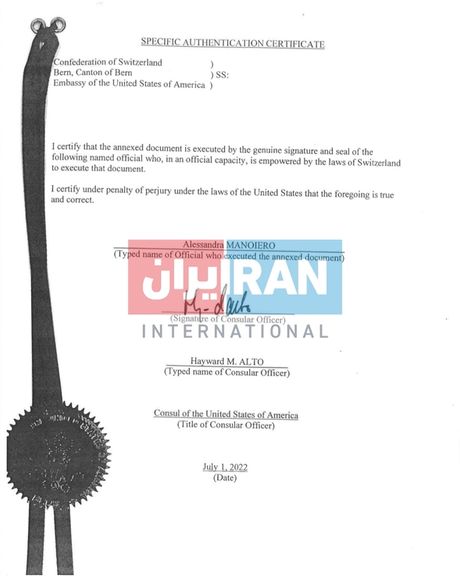
In May 2021, some family members filed a civil lawsuit against Iran and senior officials they believe were to blame for the incident. Canada’s Ontario Court ruled that the downing of the plane was an intentional act of terrorism and on December 31, 2021, awarded compensation to be shared by the estates of the six victims.
In June, Canada's international human rights parliamentary subcommittee criticized the government's “passive” approach toward Iran’s widespread human rights abuses in a House of Commons subcommittee meeting attended by several political and human rights activists – including the spokesman of the Association of Victims' Families, Hamed Esmaeilion.
The airliner was shot down by two air-defense missiles fired by the IRGC on January 8, 2020, as it took off from Tehran’s Imam Khomeini International Airport. All 176 passengers and crew, including 63 Canadians and 10 from Sweden, as well as 82 Iranian citizens on the plane died in the disaster.

Washington will enforce all sanctions on Russia and Iran, the State Department said Thursday referring to the potential transfer of Iranian drones to Moscow.
A State Department spokesperson reiterated during a briefing that “Iran is preparing to provide Russia with several hundred UAVs, including weapons-capable UAVs,” warning that the US will enforce its sanctions.
Iran did not immediately respond to the statement, but it has never explicitly denied US accusations that it plans to sell military drones to Russia, limiting itself to general expressions of neutrality in the Ukraine war.
Responding to US calls not to provide drones to Russia, Iranian foreign ministry’s spokesman on July 20 said “technical cooperation” with Moscow predated the Ukraine war. “Iranian and Russian technological cooperation predates developments in Ukraine. Any linkage between our cooperation with Russia with developments in Ukraine is intentionally biased.”
But the State Department's warning about enforcing sanctions showed a stiffening of American and possibly European positions on the issue, as an overt supply of Iranian weapons in the Russian invasion would mark the first regular involvement of a country in the conflict on the side of Russia, except Belarus.
“Let me be clear: We will vigorously enforce all US sanctions on both the Russian and Iranian arms trades...including but not limited to Russia-specific authorities and our worldwide nonproliferation sanctions.,” the US spokesperson underlined.
The Biden administration faces a dilemma stemming from Iran’s actions as it tries to revive the 2015 nuclear agreement (JCPOA) by indirect talks with Tehran. If it intensifies its rhetoric and resorts to more sanctions, a new nuclear agreement, already proving to be very hard to achieve, will become even more complicated. If it ignores Iran’s actions, it will come under fire by domestic critics for signing deals with a country behaving aggressively against US interests.
Another complicating factor is Iran’s apparent plots to assassinate former US officials on American soil, which was once again highlighted by the Department of Justice indicting an IRGC operative for trying to hire a hitman to kill former national security adviser John Bolton and possibly former Secretary of State Mike Pompeo.
The Biden administration has strongly condemned Iran’s actions and issued warnings, but it still keeps the nuclear deal on track, separating the issue of Tehran’s malign behavior from its goal of restoring the JCPOA.
At the same time, Iran is driving a hard bargain, slowing the negotiations and extracting concessions.
This policy will make any new nuclear deal achieved with Iran even shakier, inviting rejection by all Republicans and even many Democrats.
In the meantime, Tehran is glorifying its closer relations with Russia, with Supreme Leader Ali Khamenei in July clearly praising Vladimir Putin’s decision to attack Ukraine.
The quandary the Biden administration faces in trying to deal with Iranian threats and at the same time negotiate for a nuclear deal that would release billions of dollars for Tehran, is apparent from another comment by the State Department spokesperson.
“We remain incredibly concerned about Iran’s use and proliferation of UAVs. They have been used to attack U.S. forces, our partners in the region, and international shipping entities. We will continue to use all available tools, including but not limited to sanctions, to prevent, deter, and dismantle the procurement network that supply UAV-related material and technology to Iran.”
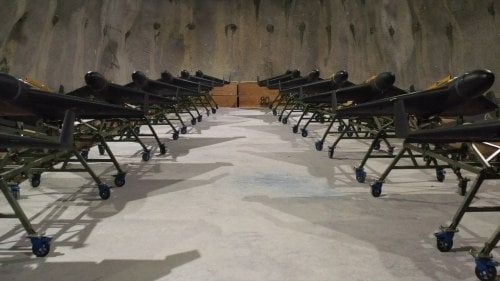
The US said Thursday that Russian officials have undergone training in Iran in recent weeks as part of an agreement on the transfer of drones from the Islamic Republic.
US State Department deputy spokesperson Vedant Patel reiterated during a phone briefing that Russian officials had conducted training on drones in Iran "in the last several weeks."
He said Washington would "vigorously enforce" its sanctions on both Russian and Iranian weapons trading as the transfers of drones between the two countries was "potentially sanctionable under numerous authorities," noting that "We remain incredibly concerned about Iran's use and proliferation of UAVs. They have been used to attack US forces, our partners in the region, and international shipping entities.”
Since last month, US officials have repeatedly said that Washington had information that Iran was preparing to provide Russia with up to several hundred drones, including some that are weapons capable, and that Russian officials had visited Iran to view attack-capable unmanned aerial vehicles (UAVs)
Iran has been supplying drones to its allies in the Middle East for a long time but selling drones to Russia to for its war in Ukraine has raised serious international concerns.
Iran's foreign minister denied the claim, including in a phone call with his Ukrainian counterpart but late In July, an Iranian lawmaker said the military cooperation between Tehran and Moscow has upset the political equations of the global order, confirming Russia’s request to buy Iranian drones.
US National Security Adviser Jake Sullivan warned twice in July that Moscow appears to be looking at buying Iranian drones and Russian officers even visited a drone base in Iran’s Kashan to review their options.
An adviser to President Volodymyr Zelensky told Iran International on July 25 that Russia and Iran are allies in the Ukraine war and it won’t be a surprise if Tehran supplies drones to Moscow.
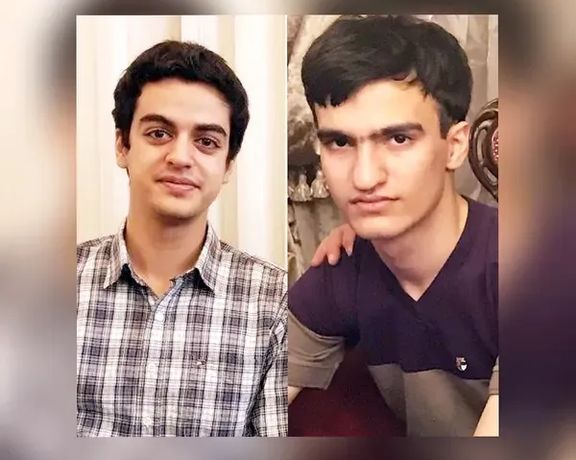
Officers threatened to sexually assault two university students who are imprisoned in Iran on security charges, the brother of one them told Iran International.
In an interview with Iran International on Thursday, Reza Younesi said that his brother Ali Younesi and another student Amir Hossein Moradi were repeatedly threatened to be killed or raped by agents while they were incarcerated in solitary confinement.
Reza, who is based in Sweden, referred to a report by the Amnesty International released on August 4 that disclosed new details about the two, saying even their families were not aware of their situation and the ill-treatment because they were held in solitary confinement for nearly 60 days without any contacts with their families and lawyers.
According to an informed source cited by the Amnesty International, they “confessed” under the threat of death and sexual violence after being transferred out of Section 209 of Tehran’s Evin Prison to a location outside prison, where Ministry of Intelligence agents warned them prison regulations did not apply.
Amnesty International also said that after Branch 36 of the Appeals Court upheld their convictions and sentences on June 6, 2022, Ministry of Intelligence agents visited Amirhossein Moradi’s father and made vague promises about the possibility of his son’s release in exchange for agreeing to a “friendly” interview with state TV and publicly criticizing dissidents, which Amirhossein Moradi refused.
The two Sharif University award-winning science students were arrested in April 2020, with a judiciary spokesman announcing that explosive devices had been found in their homes and that they had links to “counter-revolutionary groups.”
After a grossly unfair trial, a Revolutionary Court in Iran sentenced the duo to 16 years in prison on April 25, 2022, over spurious national security charges such as “gathering and colluding to commit crimes against national security”, “spreading propaganda against the system [regime]” and “destruction of public property” for their participation in peaceful protests in January 2020 and their families’ real or perceived ties to exiled Albania-based opposition group Mujahideen-e Khalq (MEK). Their convictions were based on “confessions” which both men retracted in court and said were obtained under torture and other ill-treatment.
“The authorities violated their [Moradi and Younesi] right to be presumed innocent by publicly accusing them of ties to ‘counterrevolutionary’ groups apparently based on their families’ real or perceived association” with the opposition group MEK, Amnesty wrote in November 2021.
In a letter in January, several Nobel Laureates and leading academics asked United Nations Secretary-General Antonio Guterres and Human Rights High Commissioner Michelle Bachelet to petition Iran over Moradi and Younesi. In May 2021, more than 170 professors and students at Sharif University wrote a letter to the Iranian authorities demanding their release. Younesi won the gold medal in the International Astronomy Olympiad in 2018 in China, and Moradi was an award-winning physics student.
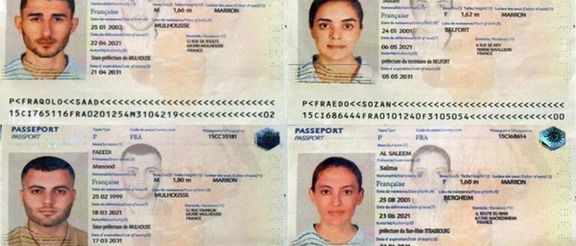
Argentina has detained four “Iraqi” citizens with fake French passports at Ezeiza airport outside Buenos Aires since Monday.
Security Minister Fernandez Anibal said on Wednesday that the four were arrested Monday night at the Ezeiza international airport as they tried to board a plane with false documents. The individuals intended to travel to the Netherlands on a KLM airline flight.
Some reports said the two couples were of Iranian origin but it was not confirmed by any Argentinian official. The suspects were later identified as Iraqi Kurds, and members of the Yazidi religion who fled Iraq with the aim of establishing themselves in Germany via Amsterdam.
He added their case is being investigated by the same federal judge in charge of the Iranian plane grounded in Argentina, Federico Villena.
Villena is the same magistrate who is investigating the 14 Venezuelans and five Iranians who arrived in this capital in June on a plane from the Venezuelan state company Emtrasur, a subsidiary of Conviasa, grounded over links to Iran’s Revolutionary Guard.
Earlier in August, Villena authorized the departure of 12 of the 19 people who were onboard, ordering four Iranians and three Venezuelans to be retained in Argentina.
Registered as a Venezuelan cargo plane, the aircraft was used by the Iranian company Mahan Air and transported a group of Iranian officials, including pilot Gholamrez Ghasemi, a senior executive of the airline Qeshm Fars Air, who is a member of the IRGC and a former board member of Fars Air Qeshm who stands accused of transporting weapons for Hezbollah during the civil war in Syria.
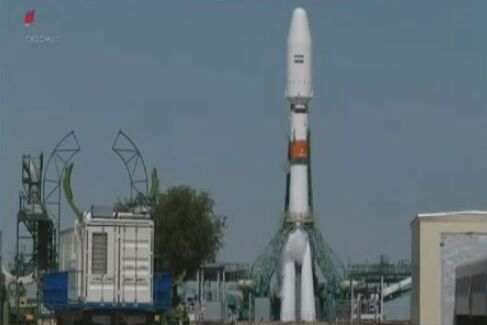
Iranian government spokesman Ali Bahadori Jahromi says the country plans to order three more versions of the Khayyam satellite with the cooperation of Iranian scientists.
In a tweet on Thursday, he said the stabilization process of the satellite, dubbed Khayyam after a 12th-century Persian polymath, was done successfully.
He added that Iranian knowledge-based companies will be able to use its images and data in various fields.
As Iran’s homegrown attempts at putting satellites into orbit have largely failed due to its technological limitations, Russia agreed to build and launch the Kanopus-V Earth-observation satellite that can resolve features as small as 3.9 feet (1.2 meters) on Earth's surface at a cost of about $40 million in a deal negotiated nearly four years. Iran claims it was designed by the country’s scientists but it is one of a series of satellites developed by the All-Russian Scientific Research Institute of Electromechanics.
Russia launched the controversial satellite into space Tuesday, August 9, from its Baikonur space station in Kazakhstan as planned.
The satellite sparked controversy last week when The Washington Post quoted two Western security officials as saying that Moscow intends to use the space platform for several months or longer, to enhance its surveillance of military targets for its war in Ukraine, and Iran may not be able to take control of the satellite right away.
Iran's Space Agency denied the report on August 7, saying the satellite will be fully operated and controlled by the Islamic Republic from inside Iran.